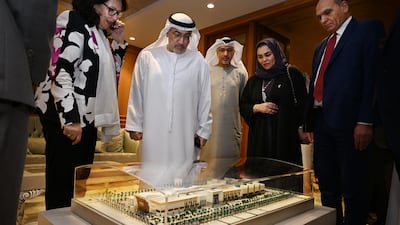The UAE and Tunisia have signed an agreement to restore the Tunis home of 14th century thinker Ibn Khaldun and turn it into a museum to preserve his mark on history.
The agreement was signed by Abdulrahman Al Owais, chairman of the board of trustees of the Sheikh Zayed Grand Mosque Centre, and Hayat Al Qarmazi, Tunisia's Minister of Cultural Affairs.
The initiative is being held under the patronage of Sheikh Mansour bin Zayed, Vice President, Deputy Prime Minister and Minister of the Presidential Court, and the Sheikh Zayed Grand Mosque Centre.
“The initiative to restore the house of the great Arab scholar and philosopher Ibn Khaldun in Tunis constitutes one of the initiatives of the Sheikh Zayed Grand Mosque Centre for preserving human heritage at all local, Arab and international levels,” said Mr Al Owais, who is also Minister of Health and Prevention and Minister of State for FNC Affairs.
Ms Al Qarmazi said the agreement was a “step in the right direction” in terms of advancing the partnership between the UAE and Tunisia in a way that showcases the rich cultural heritage of the Arab and Islamic worlds.
Ibn Khaldun home is located in the Bab Al Jedid area, one of the gates of the Tunisian capital. The house was built during the Hafsid rule and consists of a ground floor and an upper floor surrounding an open courtyard.
Born in Tunis in 1332, the scholar spent his early adult years studying law and taking part in local politics as he dealt with Arab tribesmen.
He wrote The Muqaddimah, a book which covered universal history, politics and civilisation, as well as biology, chemistry and theology.
Largely ignored in his lifetime, it was only 300 years later that Ibn Khaldun's work was picked up by Orientalists and became fashionable in European circles.

